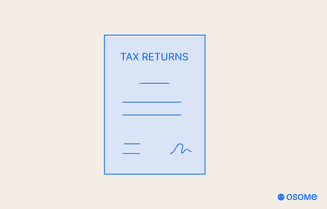Corporate Tax in Hong Kong: A Complete Guide
- Modified: 14 April 2025
- 15 min read
- Tax


Heather Cameron
Author
Heather is here to inform and inspire our readers. Boasting eight years in the world of digital marketing, working in diverse industries like finance and travel, she has experience writing for various audiences. As Osome’s resident copywriter, Heather crafts compelling content, including expert guides, helpful accounting tips, and insights into the latest fintech trends that will help entrepreneurs, founders and small business owners in Hong Kong take their businesses to the next level.

Sherman Ieong
Reviewer
Sherman Ieong is our Accounting & Tax Manager based in Hong Kong. She is on hand to help our writers level-up our blog posts and guides by making sure the information is accurate, informative and inspiring. Osome’s all-in-one accounting services make managing tax effortless - and that’s exactly what Sherman ensures we do with our Hong Kong-focused blog content, applying her knowledge of day-to-day bookkeeping, monthly financial reporting, Profits Tax Returns and much more.
Corporate tax in Hong Kong, or “corporate tax Hong Kong,” operates on a territorial principle, meaning businesses are taxed only on profits generated within the jurisdiction. This creates a favourable environment for international companies, as foreign-sourced income remains untaxed. This guide covers everything you need to know about corporate tax Hong Kong rates, the profits tax system, available incentives, and how to manage tax liabilities in Hong Kong.
Key Takeaways
- Hong Kong’s corporate tax system is based on the territorial principle, taxing only profits earned within its jurisdiction and providing various tax incentives and preferential treatments to businesses.
- Assessable profits in Hong Kong are profits from trades or businesses carried out within the territory after allowable deductions, providing significant tax advantages for businesses with international operations.
- Hong Kong offers a two-tiered profits tax system to support SMEs, flat tax rates for corporations and unincorporated businesses, and various tax incentives such as the Foreign-Sourced Income Exemption and enhanced R&D deductions.
What Is Corporate Tax in Hong Kong?
Hong Kong’s corporate tax system is renowned for its simplicity and business-friendly nature, making it a magnet for international businesses. The cornerstone of the Hong Kong corporate income tax system is the territorial principle, which ensures that only profits earned within Hong Kong are subject to tax. This means that companies can operate globally without worrying about needing to pay tax on their worldwide income, a significant advantage for businesses with diverse revenue streams.
The Hong Kong profits tax is the primary form of corporate income tax levied on businesses. Hong Kong maintains a straightforward approach, unlike many jurisdictions that impose complex multi-tier tax structures. This reduces the administrative burden on companies and provides a predictable tax environment, which is crucial for strategic planning and investment decisions.
Navigating the intricacies of Hong Kong’s tax system can be a challenge, but Osome can help! Our professional team of expert accountants offer a comprehensive suite of accounting services to support your growth, allowing you to focus on what you do best – running your business.
Furthermore, Hong Kong offers various tax exemption incentives and preferential tax treatments to reduce the overall tax burden on businesses. This includes:
- Tax exemptions for specific income types
- Lower tax rates for qualifying activities
- Concessionary profits tax rate for Corporate Treasury Centres (CTCs) that meet certain criteria
Businesses aiming to optimise their tax liability and leverage the benefits of Hong Kong’s corporate tax system need to understand these nuances.
What Is Hong Kong Profits Tax?
Hong Kong profits tax is imposed on the profits derived from businesses, trades, or professions within the jurisdiction. This corporate income tax is applicable to incorporated and unincorporated businesses. Following the territorial taxation concept, only the profits sourced in Hong Kong are taxable. This principle is particularly advantageous for businesses with international operations, as they will not need to pay tax on profits generated outside Hong Kong.
Determining the source of profits is based on examining the activities that generated the profit and where those activities were carried out. This means businesses need to clearly document their operations to establish the origin of their profits. Both incorporated businesses, such as companies registered under the Hong Kong Companies Ordinance, and unincorporated businesses, including sole proprietorships and partnerships, must pay profits tax if they carry out trade, profession, or business in Hong Kong.

Capital gains, often complex in taxation, are not taxable under Hong Kong’s profits tax system. However, distinguishing between capital gains and trading profits can sometimes be challenging and subject to interpretation. Overall, the simplicity and clarity of the profits tax system make Hong Kong an attractive location for businesses seeking a straightforward tax regime.
What Do Businesses Need to Know About Assessable Profits?
Assessable profits in Hong Kong are levied only on the profits arising from carrying on a trade, business, or profession within the territory. This means that profits arising from outside Hong Kong are not subject to profits tax, even if remitted back to Hong Kong. This territorial principle offers businesses a significant advantage, allowing them to operate globally while minimising local tax obligations.
Businesses must determine their net profits and subtract any allowable deductions to calculate assessable profits. These deductions can include various business expenses, provided they are not capital. Interest expenses, for instance, are generally not deductible if paid to an overseas recipient who is not subject to profits tax in Hong Kong. This can impact the overall tax liability and requires careful financial planning and documentation.

Newly registered businesses should pay particular attention to the rules surrounding assessable profits. It is vital for businesses to understand:
- What constitutes assessable profits
- How to calculate these profits for compliance and effective tax planning
- How to take advantage of allowable deductions and understand exclusions
By understanding these concepts, businesses can optimise their tax position and reduce their tax burden.
Provisional Profits Tax
Provisional profits tax is a prepayment of the tax that businesses are expected to pay in the current financial year. This system ensures a steady flow of revenue for the government and helps businesses manage their tax responsibilities throughout the year. The amount of provisional profits tax paid is generally based on the assessable profits of the previous year. Once this tax paid is accounted for, businesses can better plan their finances.
Businesses must settle their provisional profits tax in two instalments, with the first due around December or January and the second around April. This staggered payment schedule helps businesses manage their cash flow more effectively. If a business expects its profits to be significantly lower or higher than the previous year, it can request adjustments to the tax. This flexibility allows businesses to align their tax payments more closely with their financial performance.

If a business’s actual profits for the year are less than the provisional amount paid, the excess can be refunded or credited against future tax liabilities. This mechanism prevents an excessive tax burden on businesses, allows for the recovery of overpaid amounts, and provides a safety net that aligns tax requirements with actual performance.
Tax Rates in Hong Kong
Hong Kong boasts a flat corporate tax rate of 16.5% on profits earned within the jurisdiction. This single-tier normal profits tax rate applies to all corporations, providing a straightforward and predictable tax environment. For businesses that are not incorporated, such as sole proprietorships and partnerships, the profits tax rate is slightly lower at 15%. This differentiation acknowledges the varying capacities and scales of different business structures.
In recent years, Hong Kong has implemented a two-tiered profits tax system to support small and medium-sized enterprises (SMEs). Under this system, the first HK$ 2 million for qualified enterprises is taxed at a reduced tax rate of 8.25% for corporations and 7.5% for unincorporated businesses. In contrast, the normal profits tax rate applies to the remaining profits. This tiered system provides significant tax relief for smaller businesses, encouraging entrepreneurship and economic growth.
For-profits exceeding the initial HK$ 2 million, the normal profits tax rate of 16.5% for corporations and 15% for unincorporated businesses apply to the remaining profits. However, only one entity within a group of connected entities is eligible for the two-tier tax rates. This ensures that the tax benefits are targeted at independent small businesses rather than larger corporate structures.
Tax Incentives and Exemptions
Hong Kong offers a range of tax incentives and exemptions designed to reduce the overall tax burden on businesses and encourage economic activity. One significant recent development is the Foreign-Sourced Income Exemption (FSIE) regime, effective from January 1, 2024, which expands the scope of foreign-sourced income that qualifies for tax exemption. This includes interest income, dividends, intellectual property income, and gains from the disposal of equity interests and other assets.
Entities aiming for these exemptions must satisfy the economic substance requirements outlined by the Inland Revenue Department (IRD). This alignment with international standards aims to prevent cross-border tax avoidance while providing legitimate tax relief for global businesses. Offshore funds that meet specific criteria may also be exempt from profits tax, further enhancing Hong Kong’s appeal as a financial hub.
Additionally, Hong Kong offers the following tax deductions:
- 100% deductions for new expenditures on manufacturing machinery
- 100% deductions for capital expenditures for environmental protection
- 100% deductions for capital expenditures for intellectual property rights
- Up to 300% deductions for specific types of research and development (R&D) expenses
These incentives underscore Hong Kong’s commitment to fostering innovation and sustainable business practices.
How To File Profits Tax Returns?
Filing a corporate profits tax return in Hong Kong typically begins with the release of income tax returns in April. Upon receiving the Profits Tax Return, businesses usually have a one-month window to request a statutory extension if necessary. The first Profits Tax Return, BIR51, is issued approximately 18 months after a company has commenced business operations, offering a more extended filing period of up to three months.
Businesses must prepare comprehensive financial statements, such as the balance sheet, profit and loss statement, and auditor’s report, to accurately complete the Profits Tax Return. The tax return form requires detailed information about the business, its taxable income and its assessable profits, which must be filled out precisely. Supporting documents such as invoices, receipts, and contracts must be attached to the tax return form to substantiate the figures reported.

Common mistakes in filing profit tax returns include submitting incorrect information or omitting details, leading to discrepancies and potential penalties. To correct errors before receiving the notice of assessment, businesses should write to the Assessor with relevant documents. If errors are discovered after receiving the notice of assessment, a notice of objection must be lodged within one month.
In cases where excessive tax is due to errors or omissions, businesses can apply for a revision of assessment within six years after the relevant year of assessment. Supporting evidence must be provided to substantiate claims of errors or omissions. Following these steps allows businesses to file their profits tax returns accurately and compliantly, thereby minimising the risk of penalties and optimising their tax position.
Tax Deductions and Allowances
In Hong Kong, expenses incurred for producing taxable profits, not capital, are generally deductible. This includes a wide range of business expenses, such as bad debts, which can be deducted if proven to be bad within the basis period for a year of assessment. Pension expenses are also deductible, provided the contributions do not exceed 15% of the employee’s total emoluments.
Depreciation allowances play a crucial role in reducing businesses' taxable income. These include initial and annual allowances on industrial and commercial buildings and structures. For example, an initial allowance of 20% and an annual allowance of 4% apply to the cost of construction or purchase of industrial buildings or structures for qualifying trades. Commercial buildings or structures qualify for an annual allowance of 4% on capital expenditure incurred.

Plant and machinery enjoy an initial allowance of 60% of capital expenditure, plus annual allowances at rates of 10%, 20%, or 30%, depending on the depreciation pool. Research and development expenses qualify for a 100% deduction for Type A expenditure and up to 300% for Type B expenditure, subject to specific conditions. Businesses can effectively optimise their tax liability through these deductions and allowances.
Special Tax Treatments
The Patent Box Regime in Hong Kong provides a concessionary tax rate for assessable profits derived from eligible intellectual property income. This regime, effective for assessment years beginning on or after April 1, 2023, offers a concessionary tax rate of 5% on eligible income. The aim is to encourage innovation and intellectual property development within Hong Kong.
Eligible intellectual properties under the Patent Box Regime include patents, plant variety rights, and copyrighted software, provided they are generated from R&D activities. The regime uses the R&D fraction to determine the portion of assessable profits that qualify for the concessionary tax rate. This ensures a direct connection between the income-receiving benefits and the expenditures contributing to that income. Transitional measures allow a three-year rolling average for calculating R&D expenditures.
Impact of Salaries Tax Paid and Domestic Expenses
The deductibility of salaries tax paid and the non-deductibility of domestic or private expenses significantly influence the determination of taxable income for corporate tax purposes in Hong Kong. Salaries tax paid on employees’ remuneration is deductible when calculating assessable profits for corporate tax purposes. This means that businesses can reduce their taxable income by the amount of salaries tax paid, thereby lowering their overall tax liability.
Conversely, domestic or private expenses, including personal costs unrelated to the production of profits, are non-deductible. This distinction ensures that only expenses directly related to generating business income are considered, maintaining the tax system's integrity and preventing abuse by deducting unrelated personal expenses.
Tax Obligations with the Inland Revenue Department
Employers in Hong Kong have significant obligations to the Inland Revenue Department (IRD). One of the primary responsibilities is maintaining thorough records of each employee’s personal details, employment nature, remuneration, and benefits from the start of employment. Maintaining meticulous records is vital for businesses to report taxes accurately and adhere to local regulations.
Employers must promptly report any changes in an employee’s personal particulars or employment terms to the Inland Revenue Department. For new hires, an IR56E form must be filed within three months if the employee is likely to be chargeable to Salaries Tax. Similarly, upon terminating an employee’s service, an IR56F form must be submitted one month before the termination date. If an employee plans to leave Hong Kong permanently, employers must file an IR56G form one month prior and withhold any due payments until tax clearance is obtained.

The ‘Save-As-You-Earn’ (SAYE) Scheme is another tool for Hong Kong civil servants that allows them to make monthly deductions from their salaries or pensions to purchase Tax Reserve Certificates (TRCs). The ‘Auto Tax Payment Service’ also ensures on-time tax payment by automatically redeeming TRCs in the taxpayer’s account when tax is due. These measures help facilitate timely tax payments and efficient tax management.
What You Should Know About Tax Reserve Certificates?
Tax Reserve Certificates (TRCs) are financial instruments that assist taxpayers in building funds for tax payments. There are two types of TRCs: ordinary TRCs and TRCs for ‘Conditional Standover Order’. Ordinary TRCs help taxpayers save for upcoming tax payments and are issued only electronically. These can be purchased through various electronic channels, including bank autopay, telephone, internet, and ATMs, in denominations of HK$ 300 or above, with multiples of HK$ 50.
TRCs for ‘Conditional Standover Order’ act as qualifying debt instruments are issued in paper form and serve as security in tax disputes. As qualifying debt instruments, these TRCs earn interest only when redeemed to pay the holder’s tax, with interest rates updated monthly based on average bank deposit rates.
A sound understanding of the benefits and uses of TRCs can greatly assist businesses in managing their tax payments and ensuring timely compliance.
How To Manage Tax Credits and Withholding Taxes?
Effective management of tax credits and withholding taxes is imperative for businesses operating in Hong Kong. The region’s double tax treaties (DTAs) prevent businesses from being taxed twice on the same international income. Over the past fifteen years, Hong Kong has expanded its network of DTAs to provide better relief for businesses with cross-border operations. These treaties ensure that income is only taxed once, either in Hong Kong or the partner jurisdiction, depending on the specific provisions of the agreement.
The Inland Revenue Department (IRD) updated its Departmental Interpretation and Practice Notes (DIPN) 28 in 2019, clarifying that no deduction for withholding tax is allowed under general principles unless specified in Section 16(1)(c). This update reinforces the importance of understanding specific tax provisions and ensuring compliance with local tax regulations. With effective management, businesses can optimise their tax liability and avoid potential pitfalls associated with international taxation.
Common Mistakes and How To Avoid Them
Businesses often need help with common mistakes that can lead to significant tax issues. One frequent error is not keeping comprehensive and accurate records, which can result in discrepancies during tax audits. Proper documentation is critical, as it substantiates the figures reported in tax returns and helps avoid disputes with tax authorities.
Another common mistake is failing to distinguish between capital and revenue expenses, leading to incorrect tax filings. This can cause businesses to either overpay taxes or face underpayment penalties. Additionally, paying attention to account for all income sources, particularly those deemed taxable under specific regimes, can result in underreported profits.
Businesses can avoid these pitfalls by implementing robust record-keeping practices, clearly differentiating between expense types, and ensuring accurate reporting of all income sources.
Osome can help you navigate these complexities and ensure your tax filings are accurate and compliant. In addition to accounting services, we offer a comprehensive suite of services to empower your business growth. Contact us today to learn more!
Summary
In conclusion, navigating Hong Kong’s corporate tax system requires a thorough understanding of its various components. The region offers a straightforward and business-friendly tax environment bolstered by numerous incentives and exemptions designed to reduce the burden of tax and encourage economic growth.
By leveraging these aspects, businesses can optimise their tax positions and ensure compliance with local regulations. Whether you are a new business or an established enterprise, understanding the intricacies of Hong Kong’s tax system is essential for strategic planning and successful operation. With this comprehensive guide, you are well-equipped to manage your tax responsibilities effectively and take full advantage of the benefits offered by Hong Kong’s corporate tax framework.






